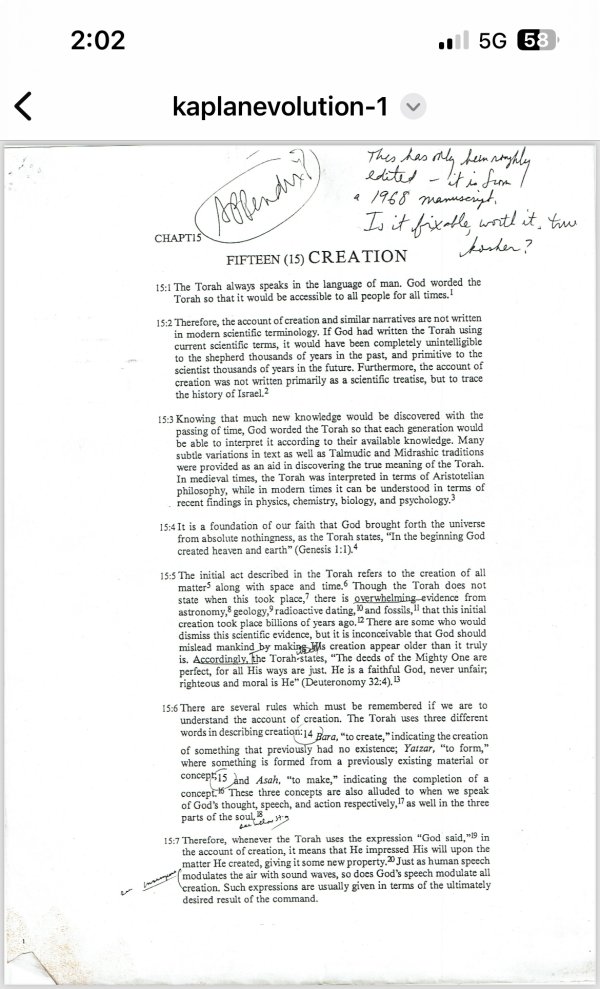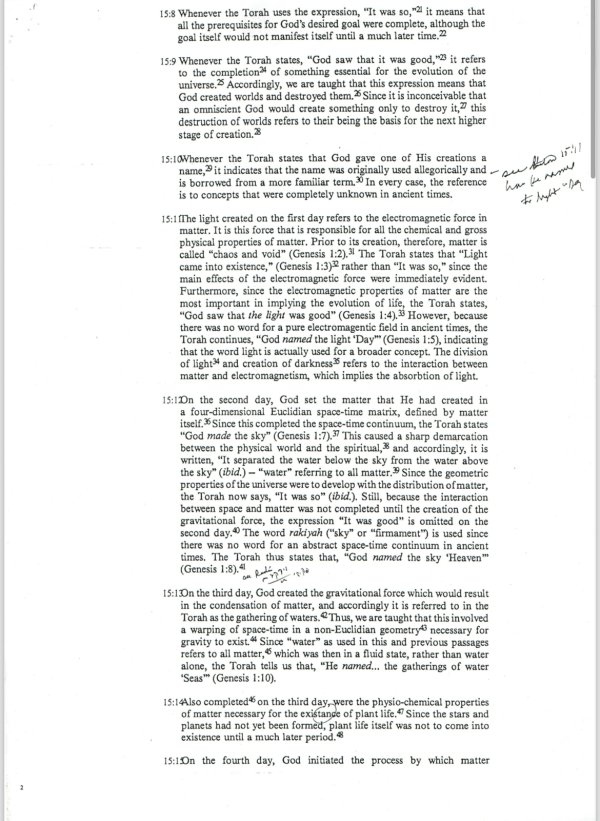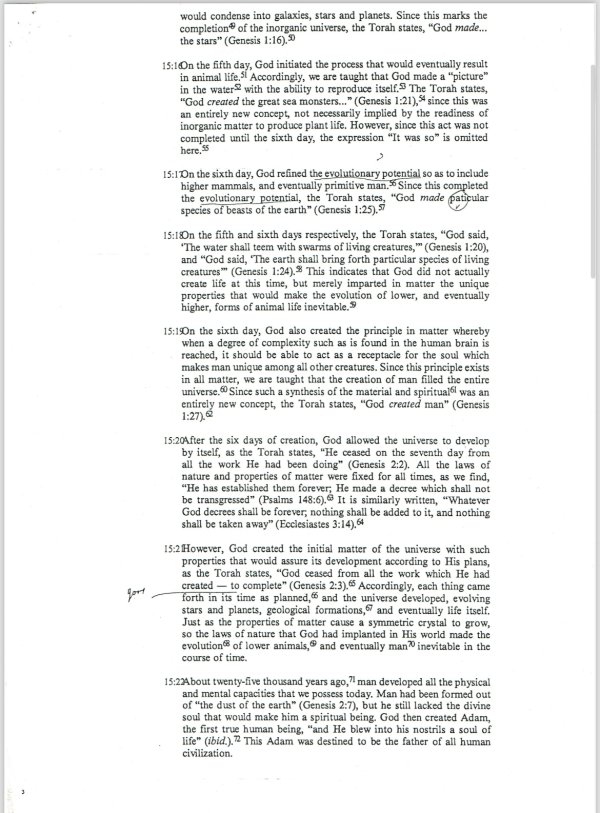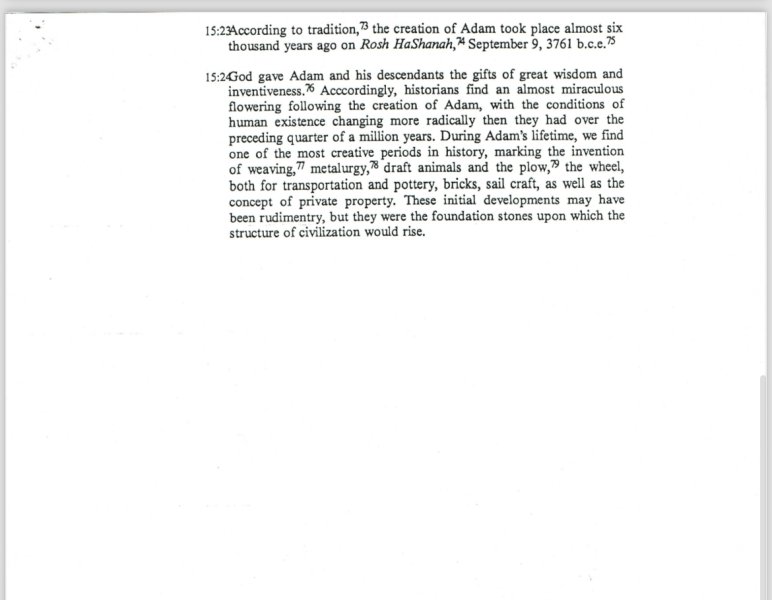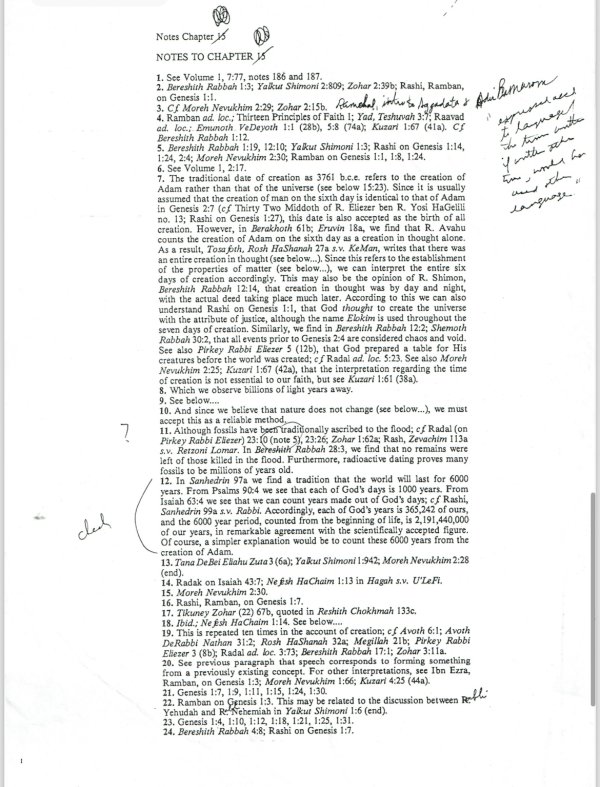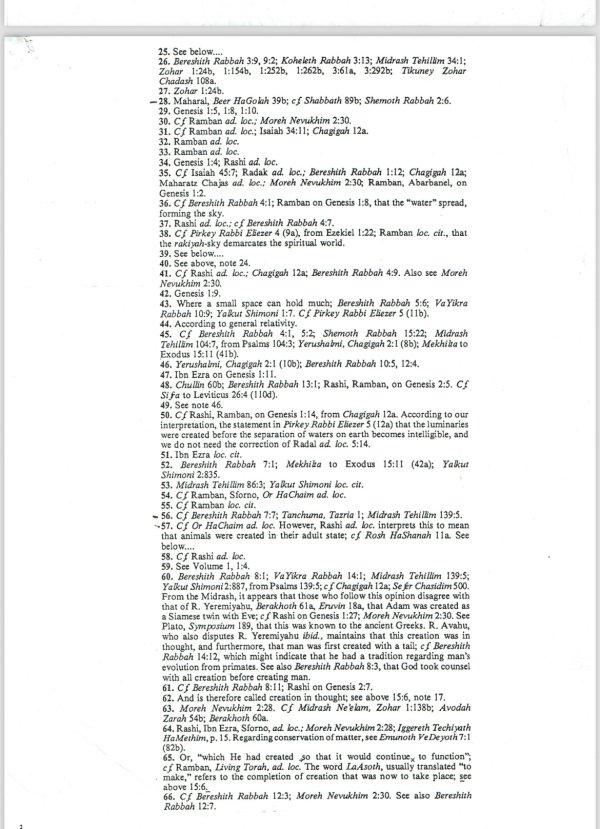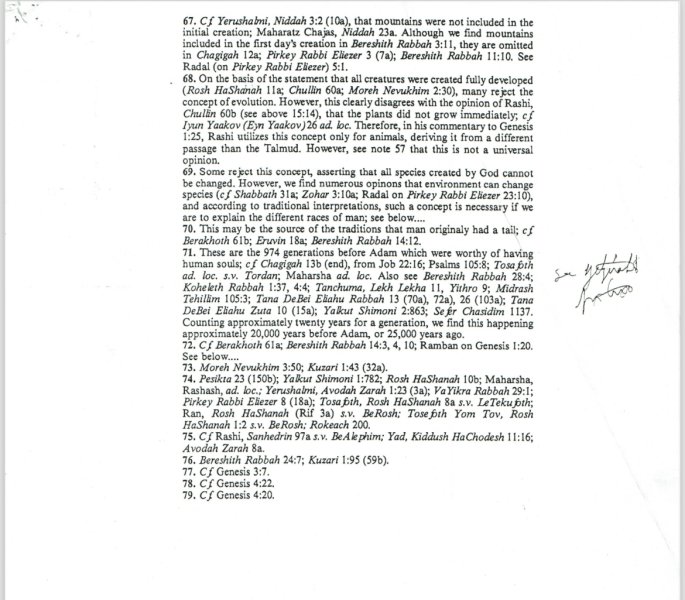Correspondence by Rabbi Menachem M. Schneerson, The Lubavitcher Rebbe
By the Grace of G‑d
18th of Teveth, 5722 [December 25, 1961]
Brooklyn, NY
Greeting and Blessing:
After not having heard from you for a long time, I was pleased to receive regards from you through the young men of Chabad who visited your community recently in connection with the public lecture. I was gratified to hear that you participated in the discussion, but it was quite a surprise to me to learn that you are still troubled by the problem of the age of the world as suggested by various scientific theories which cannot be reconciled with the Torah view that the world is 5722 years old. I underlined the word theories, for it is necessary to bear in mind, first of all, that science formulates and deals with theories and hypotheses while the Torah deals with absolute truths. These are two different disciplines, where reconciliation is entirely out of place.
It was especially surprising to me that, according to the report, the said problem is bothering you to the extent that it has trespassed upon your daily life as a Jew, interfering with the actual fulfillment of the daily Mitzvoth. I sincerely hope that the impression conveyed to me is an erroneous one. For, as you know, the basic Jewish principle of na'aseh (first)and v'nishma (afterwards) makes it mandatory upon the Jew to fulfill G‑d's commandments regardless of the degree of understanding, and obedience to the Divine Law can never be conditioned upon human approval. In other words, lack of understanding, and even the existence of "legitimate" doubts, can never justify disobedience to the Divine Commandments; how much less, when the doubts are illegitimate, in the sense that they have no real or logical basis, such as the problem in question.
Apparently, our discussion which took place a long time ago, and which, as I was pleased to learn, has not been forgotten by you, has nevertheless not cleared up this matter in your mind. I will attempt to do so now, in writing, which imposes both brevity and other limitations. I trust, however, that the following remarks will serve our purpose.
Basically the problem has its roots in a misconception of the scientific method or, simply, of what science is. We must distinguish between empirical - based on what is experienced or seen rather than on theory - or experimental science dealing with, and confined - to limit an activity, person, or problem in some way - to, describing and classifying observable phenomena, and speculative science, dealing with unknown phenomena, sometimes phenomena that cannot be duplicated in the laboratory. Scientific speculation is actually a terminological incongruity - the state of not being suitable or not fitting well with something else - ; for science, strictly speaking, means knowledge, while no speculation can be called knowledge in the strict sense of the word. At best, science can only speak in terms of theories inferred from certain known facts and applied in the realm of the unknown. Here science has two general methods of inference;
(a) The method of interpolation (as distinguished from extrapolation), whereby, knowing the reaction under two extremes, we attempt to infer what the reaction might be at any point between the two.
(b) The method of extrapolation, whereby inferences are made beyond a known range, on the basis of certain variables within the known range. For example, suppose we know the variables of a certain element within a temperature range of 0 to 100, and on the basis of this we estimate what the reaction might be at 101, 200, or 2000.
Of the two methods, the second (extrapolation) is clearly the more uncertain. Moreover, the uncertainty increases with the distance away from the known range and with the decrease of this range. Thus, if the known range is between 0 and 100, our inference at 101 has a greater probability than at 1001.
Let us note at once, that all speculation regarding the origin and age of the world comes within the second and weaker method, that of extrapolation. The weakness becomes more apparent if we bear in mind that a generalization inferred from a known consequent to an unknown antecedent is more speculative than an inference from an antecedent to consequent.
That an inference from consequent to antecedent is more speculative than an inference from antecedent to consequent can be demonstrated very simply:
Four divided by two equals two. Here the antecedent is represented by the divided and divisor, and the consequent - by the quotient. Knowing the antecedent in this case, gives us one possible result - the quotient (the number 2).
However, if we know only the end result, namely, the number 2, and we ask ourselves, how can we arrive at the number 2, the answer permits several possibilities, arrived at by means of different methods: (a) 1 plus 1 equals 2; (b) 4-2 equals 2; (c) 1 x 2 equals 2; (d) 4 divided by 2 equals 2. Note that if other numbers are to come into play, the number of possibilities giving us the same result is infinite (since 5 - 3 also equals 2; 6 divided by 3 equals 2 etc. ad infinitum).
Add to this another difficulty, which is prevalent - existing very commonly or happening often - in all methods of induction - the process of officially accepting someone into a new job or an organization - . Conclusions based on certain known data, when they are ampliative in nature, i.e. when they are extended to unknown areas, can have any validity at all on the assumption of everything else being equal, that is to say on an identity of prevailing conditions, and their action and counter-action upon each other. If we cannot be sure that the variations or changes would bear at least a close relationship to the existing variables in degree; if we cannot be sure that the changes would bear any resemblance in kind; if, furthermore, we cannot be sure that there were not other factors involved - such conclusions of inferences are absolutely valueless!
For further illustration, I will refer to one of the points which I believe I mentioned during our conversation. In a chemical reaction, whether fissional - a splitting or breaking up into parts - or fusional, - an occasion when two or more things join or are combined - the introduction of a new catalyzer - to make a chemical reaction happen or happen more quickly by acting as a catalyst - into the process, however minute the quantity of this new catalyzer may be, may change the whole tempo and form of the chemical process, or start an entirely new process.
We are not yet through with the difficulties inherent in all so-called scientific theories concerning the origin of the world. Let us remember that the whole structure of science is based on observances of reactions and processes in the behavior of atoms in their present state, as they now exist in nature. Scientists deal with conglomerations - made up of parts from various sources or of various kinds - of billions of atoms as these are already bound together, and as these relate to other existing conglomerations of atoms. Scientists know very little of the atoms in their pristine -a state of being like new : perfect condition - state; of how one single atom may react on another single atom in a state of separateness; much less of how parts of a single atom may react on other parts of the same or other atoms. One thing science considers certain - to the extent that any science can be certain, namely that the reactions of single atoms upon each other is totally different from the reactions of one conglomeration of atoms to another.
We may now summarize the weaknesses, nay, hopelessness, of all so-called scientific theories regarding the origin and age of our universe:
(a) These theories have been advanced on the basis of observable data during a relatively short period of time, of only a number of decades, and at any rate not more than a couple of centuries.
(b) On the basis of such a relatively small range of known (though by no means perfectly) data, scientists venture - a new activity, usually in business, that involves risk or uncertainty - to build theories by the weak method of extrapolation, and from the consequent to the antecedent, extending to many thousands (according to them, to millions and billions) of years!
(c) In advancing such theories, they blithely disregard factors universally admitted by all scientists, namely, that in the initial period of the birth of the universe, conditions of temperature, atmospheric pressure, radioactivity, and a host of other cataclystic factors, were totally different from those existing in the present state of the universe.
(d) The consensus of scientific opinion is that there must have been many radioactive elements in the initial stage which now no longer exist, or exist only in minimal quantities; some of them - elements that cataclystic potency of which is known even in minimal doses.
(e) The formation of the world, if we are to accept these theories, began with a process of colligation (of binding together) of single atoms or the components of the atom and their conglomeration and consolidation, involving totally unknown processes and variables.
In short, of all the weak scientific theories, those which deal with the origin of the cosmos and with its dating are (admittedly by the scientists themselves) the weakest of the weak.
It is small wonder (and this, incidentally, is one of the obvious refutations of these theories) that the various scientific theories concerning the age of the universe not only contradict each other, but some of them are quite incompatible and mutually exclusive, since the maximum date of one theory is less than the minimum date of another.
If anyone accepts such a theory uncritically, it can only lead him into fallacious and inconsequential reasoning. Consider, for example, the so-called evolutionary theory of the origin of the world, which is based on the assumption that the universe evolved out of existing atomic and subatomic particles which, by an evolutionary process, combined to form the physical universe and our planet, on which organic life somehow developed also by an evolutionary process, until homo-sapiens emerged. It is hard to understand why one should readily accept the creation of atomic and subatomic particles in a state which is admittedly unknowable and inconceivable, yet should be reluctant to accept the creation of planets, or organisms, or a human being, as we know these to exist.
The argument from the discovery of the fossils is by no means conclusive evidence of the great antiquity of the earth, for the following reasons:
(a) In view of the unknown conditions which existed in prehistoric" times, conditions of atmospheric pressures, temperatures, radioactivity, unknown catalyzers, etc., etc. as already mentioned, conditions that is, which could have caused reactions and changes of an entirely different nature and tempo from those known under the present-day orderly processes of nature, one cannot exclude the possibility that dinosaurs existed 5722 years ago, and became fossilized under terrific natural cataclysms in the course of a few years rather than in millions of years; since we have no conceivable measurements or criteria of calculations under those unknown conditions.
(b) Even assuming that the period of time which the Torah allows for the age of the world is definitely too short for fossilization (although I do not see how one can be so categorical), we can still readily accept the possibility that G‑d created ready fossils, bones or skeletons (for reasons best known to him), just as he could create ready living organisms, a complete man, and such ready products as oil, coal or diamonds, without any evolutionary process.
As for the question, if it be true as above (b), why did G‑d have to create fossils in the first place? The answer is simple: We cannot know the reason why G‑d chose this manner of creation in preference to another, and whatever theory of creation is accepted, the question will remain unanswered. The question, Why create a fossil? is no more valid than the question, Why create an atom? Certainly, such a question cannot serve as a sound argument, much less as a logical basis, for the evolutionary theory.
What scientific basis is there for limiting the creative process to an evolutionary process only, starting with atomic and subatomic particles - a theory full of unexplained gaps and complications, while excluding the possibility of creation as given by the Biblical account? For, if the latter possibility be admitted, everything falls neatly into pattern, and all speculation regarding the origin and age of the world becomes unnecessary and irrelevant.
It is surely no argument to question this possibility by saying, Why should the Creator create a finished universe, when it would have been sufficient for Him to create an adequate number of atoms or subatomic particles with the power of colligation and evolution to develop into the present cosmic order? The absurdity of this argument becomes even more obvious when it is made the basis of a flimsy theory, as if it were based on solid and irrefutable arguments overriding all other possibilities.
The question may be asked, If the theories attempting to explain the origin and age of the world are so weak, how could they have been advanced in the first place? The answer is simple. It is a matter of human nature to seek an explanation for everything in the environment, and any theory, however far-fetched, is better than none, at least until a more feasible explanation can be devised.
You may now ask, In the absence of a sounder theory, why then isn't the Biblical account of creation accepted by these scientists? The answer, again, is to be found in human nature. It is a natural human ambition to be inventive and original. To accept the Biblical account deprives one of the opportunity to show one's analytic and inductive ingenuity. Hence, disregarding the Biblical account, the scientist must devise reasons to justify his doing so, and he takes refuge in classifying it with ancient and primitive mythology and the like, since he cannot really argue against it on scientific grounds.
If you are still troubled by the theory of evolution, I can tell you without fear of contradiction that it has not a shred of evidence to support it. On the contrary, during the years of research and investigation since the theory was first advanced, it has been possible to observe certain species of animal and plant life of a short life-span over thousands of generations, yet it has never been possible to establish a transmutation from one species into another, much less to turn a plant into an animal. Hence such a theory can have no place in the arsenal of empirical science.
The theory of evolution, to which reference has been made, actually has no bearing on the Torah account of Creation. For even if the theory of evolution were substantiated today, and the mutation of species were proven in laboratory tests, this would still not contradict the possibility of the world having been created as stated in the Torah, rather than through the evolutionary process. The main purpose of citing the evolutionary theory was to illustrate how a highly speculative and scientifically unsound theory can capture the imagination of the uncritical, so much so that it is even offered as a "scientific" explanation of the mystery of Creation, despite the fact that the theory of evolution itself has not been substantiated scientifically and is devoid of any real scientific basis.
Needless to say, it is not my intent to cast aspersions on science or to discredit the scientific method. Science cannot operate except by accepting certain working theories or hypotheses, even if they cannot be verified, though some theories die hard even when they are scientifically refuted or discredited (the evolutionary theory is a case in point). No technical progress would be possible unless certain physical laws are accepted, even though there is no guaranty that the law will repeat itself. However, I do wish to emphasize, as already mentioned, that science has to do only with theories but not with certainties. All scientific conclusions, or generalizations, can only be probable in a greater or lesser degree according to the precautions taken in the use of the available evidence, and the degree of probability necessarily decreases with the distance from the empirical facts, or with the increase of the unknown variables, etc., as already indicated. If you will bear this in mind, you will readily realize that there can be no real conflict between any scientific theory and the Torah.
My above remarks have turned out somewhat lengthier than intended, but they are still all too brief in relation to the misconception and confusion prevailing in many minds. Moreover, my remarks had to be confined to general observations, as this is hardly the medium to go into greater detail. If you have any further questions, do not hesitate to write to me.
To conclude on a note touched upon in our conversation:
The Mitzvah of putting on Tefillin every week-day, on the hand facing the heart, and on the head - the seat of the intellect - indicates, among other things, the true Jewish approach: performance first (hand), with sincerity and wholeheartedness, followed by intellectual comprehension (head); i.e. na'aseh first, then v'nishma. May this spirit permeate your intellect and arouse your emotive powers and find expression in every aspect of the daily life, for the essential thing is the deed.

